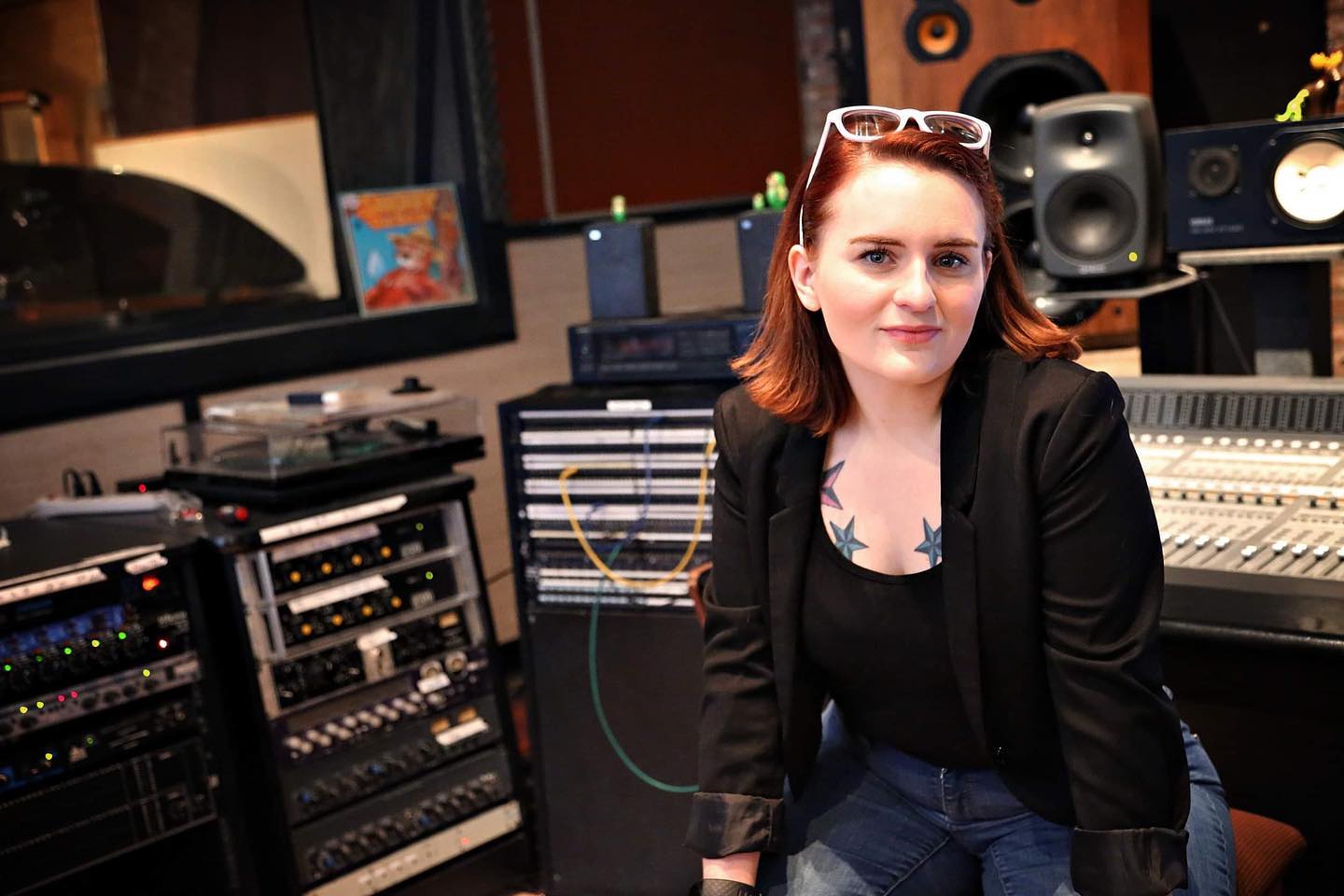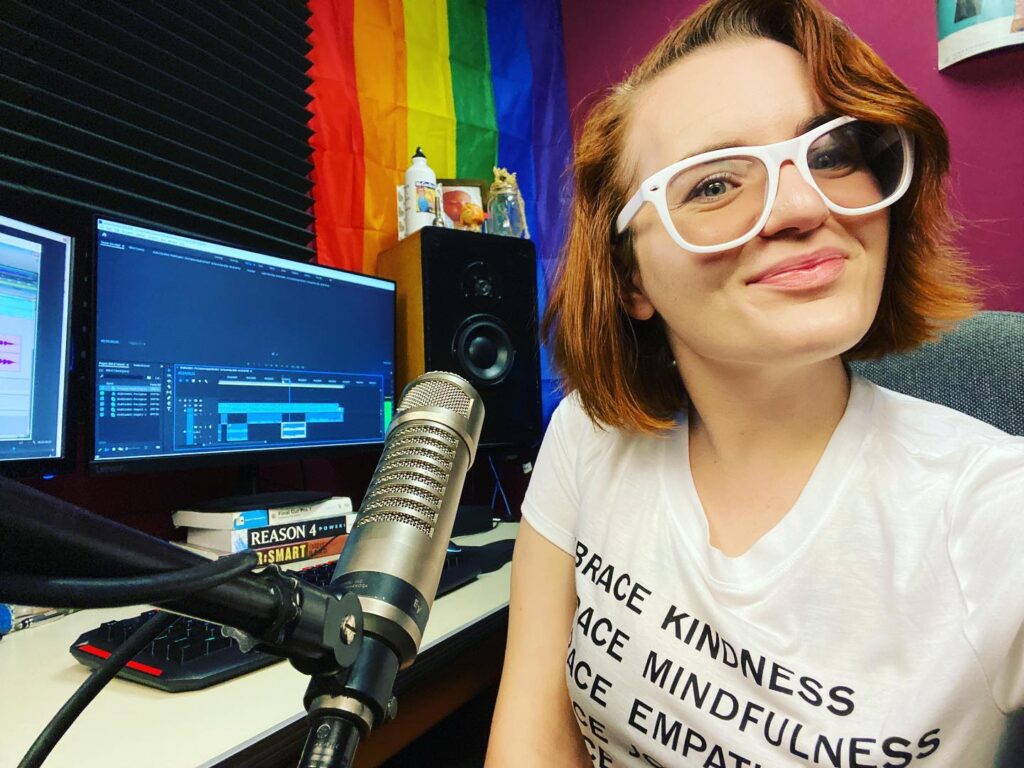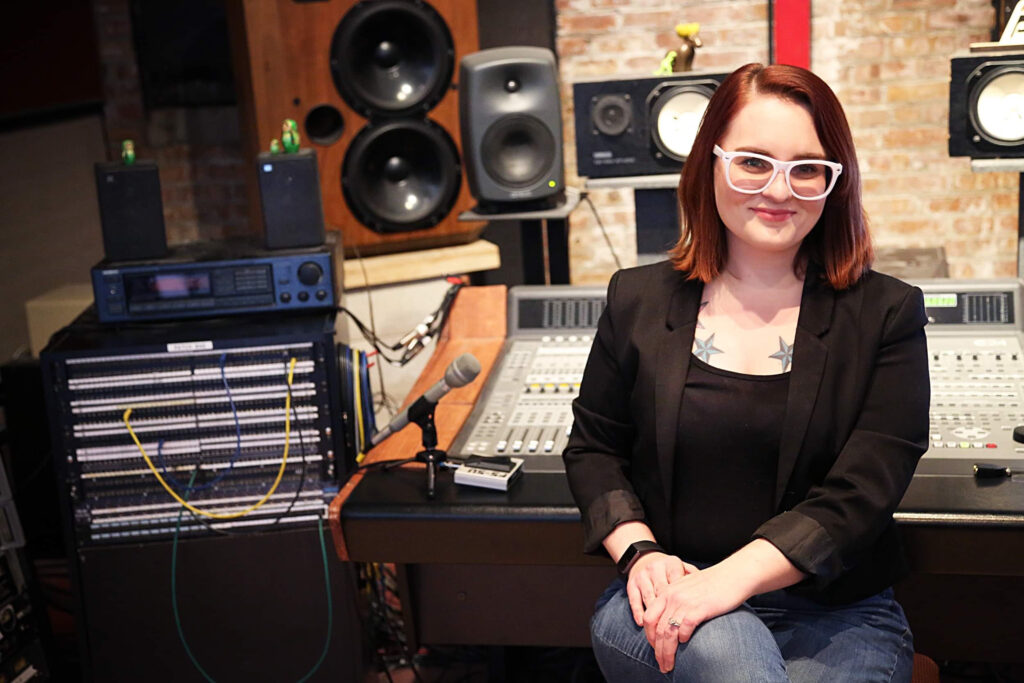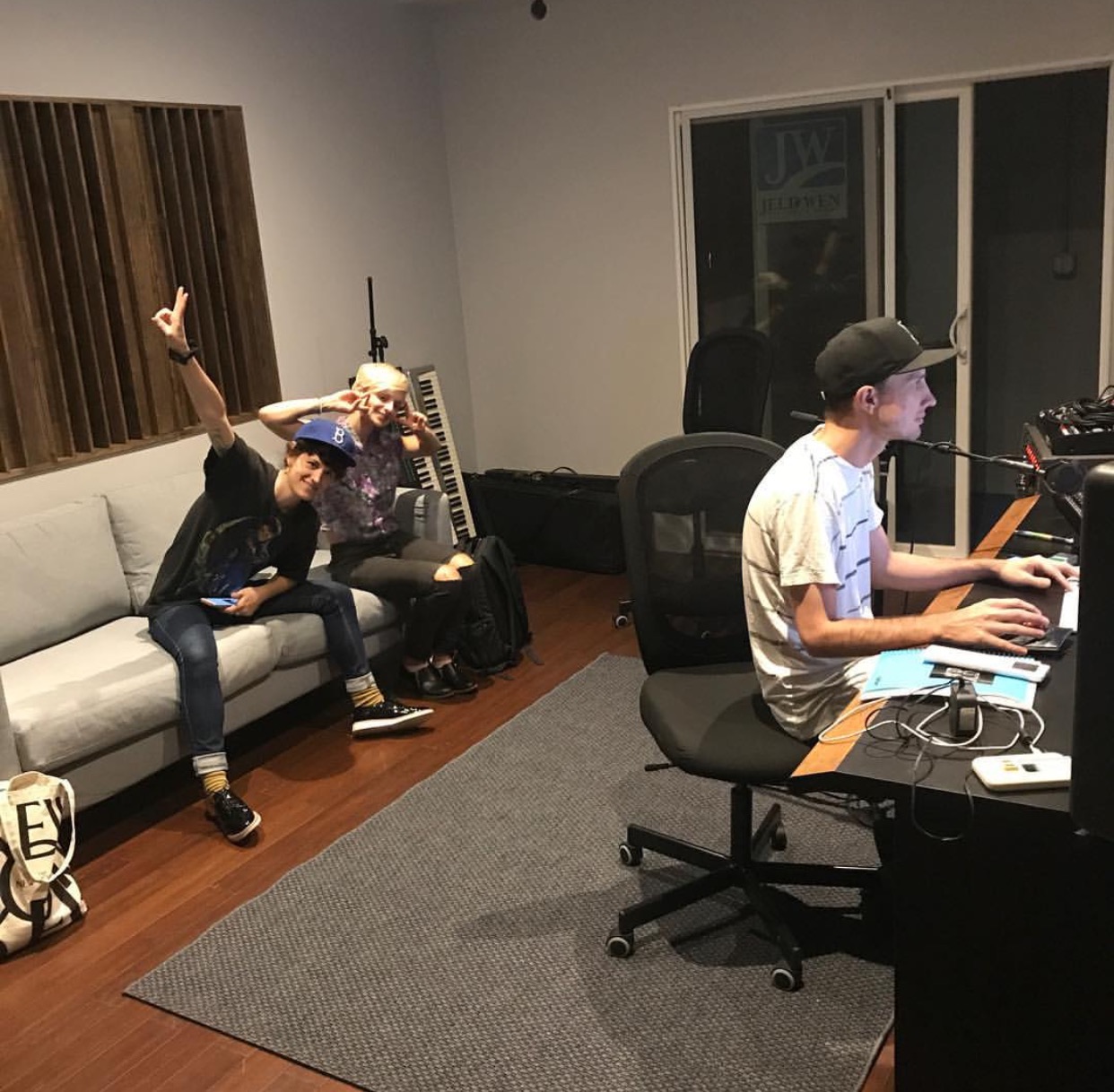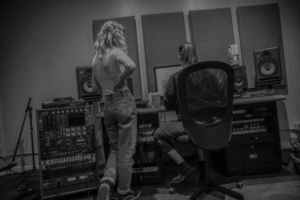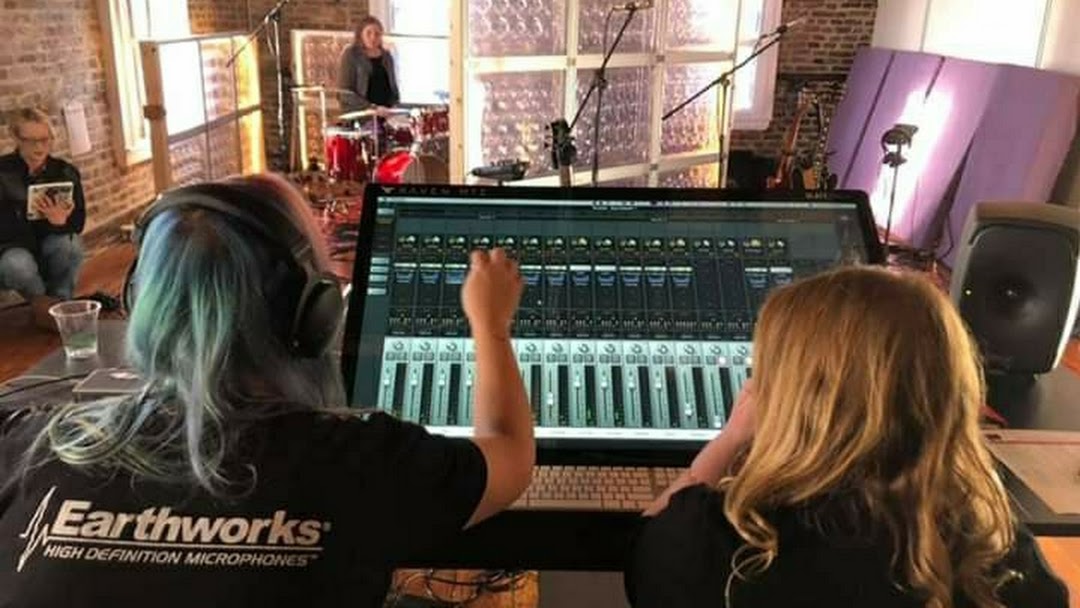
Nitrosonic Studios: Women-Owned and Operated Studio and Audio School
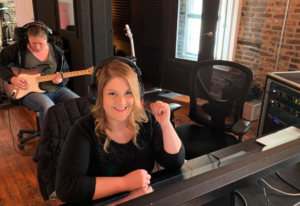 Nitrosonic Studios was founded in 2005 by producer Brian Pulito, with a mission to provide the best recording experience possible at an affordable price. Since then, Nitrosonic has grown and expanded into one of the region’s top destination studios. In late 2018. Engineers April Edwards and Danielle Barkman were handed the reins, and along with studio musician and friend Leah Arrington, they have taken Nitrosonic to all new highs.
Nitrosonic Studios was founded in 2005 by producer Brian Pulito, with a mission to provide the best recording experience possible at an affordable price. Since then, Nitrosonic has grown and expanded into one of the region’s top destination studios. In late 2018. Engineers April Edwards and Danielle Barkman were handed the reins, and along with studio musician and friend Leah Arrington, they have taken Nitrosonic to all new highs.
Boasting newly constructed studios at a convenient downtown location in Lexington, Kentucky with state-of-the-art recording gear, three professionally tuned drum kits, and a 50’x20’ live room, Nitrosonic boasts an impressive scene. It is also a one-stop-shop, with engineers specializing in recording, mixing, and mastering all under one roof. In fact, this year, they launched an Audio Engineering School with programs in each specialization in collaboration with some of the country’s most well-regarded engineers. Each education program is also offered virtually as well are the Studios’ mixing and mastering services.
We were able to catch up with both April and Danielle.
As a child, what did you imagine your career would be?
April: I wasn’t sure what I wanted as a career, but I knew I wanted to be great at whatever it was. I was always drawn to music and I took piano, guitar, violin, and vocal lessons as a child. My mother played the flute and various forms of hand percussion and she took me to a lot of Drum Circles and Operas when I was a kid. From a very young age, I was told that I had a great ear; I feel like I was destined to become an audio engineer.
Danielle: Drummer or audio person of some sort. I grew up in a musical family, most everyone played something. Drummers everywhere lol. Also Engineers. I relieved seeing a medium format console turn down and rebuilt in the dining room table when I was very young, I was drawn to it even then… all the knobs and faders were so attractive. That, or maybe grow up and join the muppets, but they were pretty musical too, so I guess I would’ve ended up in music either way.
What is your approach to recording a session? Any particular routine you’ve set for yourself to make the process smoother along the way from recording to mastering?
We try to prepare as much as possible before the session even starts. We make input lists for ourselves and monitoring lists for the musicians, so everyone is on the same page and there is no confusion. We have bands drop their gear off the night before so we can have it miked and ready for soundcheck when they walk in for the session. We spend a lot of time on preproduction planning; this includes figuring out where we want the instruments and players to live, where to place our Airhush Gobos, which Earthworks Audio microphones we’re going to use, and how, which Unison Preamps we want to run through and more!
We are constantly striving to “get it right at the mic” because it makes every phase after recording that much easier and more enjoyable if you do. Instead of spending time trying to fix things in the mix and master, we get to be creative and have fun! While recording as a team, April is already thinking about the Mix and Danielle is already thinking about the Master, and we make decisions together that help us achieve the best results in those next stages.
Additionally, a big part of this job is playing “psychologist”. You have to learn what makes your clients tick and how to get the best performances out of people. We make sure our clients are comfortable, having fun, and “vibing” in our studio, because people perform way better that way. We make sure bands take breaks when they need to, stay hydrated, and don’t get “hangry”. It makes our job much easier when the musicians are happy and relaxed!
Let’s talk gear. Your studio is LUNA and Universal Audio equipped. Can you explain what the LUNA system is and when you first worked with UA?
The Luna Recording System by Universal Audio is inspired by an analog workflow and allows us to record with sub-2-millisecond latency from input to output. We have access to the industry’s most iconic and coveted equipment through UA’s plugins, extensions, and Unison preamps, with end-to-end emulations that precisely model the colors and behaviors of this gear that we can now use totally in the box. Nitrosonic Studios used UA gear and plugins long before we took over, but we became immersed in the UA world when we purchased our Apollo interfaces a couple of years ago and discovered LUNA last year. We fell in love with LUNA right away. It’s amazing how specific we can now be about the sounds we capture; we have access to the gear that’s found in the world’s most notorious recording studios but without the hefty price tags, and we can pick and choose what we want to sound like on any given day for any type of session. Some of our favorite features include the Neve and API Summing extensions, the Studer and Ampex Tape extensions, and the juicy list of Unison preamps and channel strips at our disposal including the Neve 88RS, the API Vision Channel Strip and the UA 610-B.
Nitrosonic Studios became woman-owned and operated in 2018 before the studio moved to its current location. Can you tell us more about how you decided to take the reins and what you envision for Nitrosonic?
In 2016, April started as an intern while enrolled in audio engineering school with The Recording Connection. About a year later, the previous owner moved out of state and handed her the reins as lead engineer and studio manager. At the time, Nitrosonic also offered band rehearsal space, which is how Leah Arrington (now the third owner of Nitrosonic) discovered the studio. Leah and her band The Slick Floors recorded an EP with April, and she happily returned with her other band Metric Soul to record a project, which is how Danielle discovered the studio. Danielle is the drummer for Metric Soul, and since the session, she’s stuck and stayed, first acting as a session drummer, assistant manager, and April’s right-hand woman. On the winter solstice of 2018, the former owner approached us and asked if we wanted to buy the studio and we eagerly accepted his offer. We then approached Leah with the opportunity of being the third owner of Nitrosonic Studios, and without hesitation, she jumped on board. Now, not only is Nitrosonic owned by three women but we also employees two women, Abigail Buettner (Studio Manager) and Amanda Aday (Creative Director). We decided to buy the studio because the choices we faced were to either continue doing what we love or get a normal job, and we weren’t about to do that.
Our vision for Nitrosonic Studios was to take it from being a small local studio to a known destination studio that bands and artists from around the world travel to record in. We are located in the thriving NoLi district in Lexington, KY, and have partnered with several businesses and Air BnB’s around the neighborhood to help accommodate the needs of traveling musicians. Before COVID hit, we were partnering with local venues to help promote our services to the acts that were coming through Lexington on their tours, and because of that, we’ve gotten to work with some amazing touring bands such as The Mike Dillon Band and Vintage Pistol. We are trying to utilize our studio as a vehicle to be able to work with the best in the industry; this doesn’t just include musicians but other engineers as well. Over the past couple of years, we have networked and built working relationships with some of the most incredible audio engineers including David Dominguez (Weezer, Guns N’ Roses, Sublime), IRKO (Pitbull, Jay Z, Snoop Dogg), and Drew Mazurek (The Neville Brothers, Bonnie Raitt, Linkin Park). Another goal of ours is to recruit more women into this field because we are seriously underrepresented and the music industry would benefit greatly from having more women audio engineers and producers because let’s face it, we’re good at what we do!
Congratulations on Nitrosonic’s Audio Engineering School. Tell us more about how the school developed and what programs are available to students.
Thank you! We are so excited about this endeavor. We realized we wanted to start teaching audio engineering because we would love to inspire more females to choose this field, but also because we realized how expensive audio engineering school can be and how outdated some of the course material is. We wanted to give a fresh and modern perspective while demonstrating how we use some of the newest and best technology on the market. There is so much random information available online that it’s sometimes hard to weed out what’s good and bad advice when it comes to audio, and so we wanted to streamline the learning process for people, so they only get the information they want and need to better themselves as engineers. Because we record, mix and master in-house, we’re able to teach people how to best execute each process in order to set themselves up for success in the next phase.
Due to the current climate, in-person learning just wasn’t a viable option, and so we created a totally online, live, and interactive program with classes on Recording, Mixing and Mastering. The classes are each four weeks long with intensive instruction for beginner to intermediate students. We are also excited about the growing list of special guest instructors that will be making appearances throughout our classes including David Dominguez, IRKO, Drew Mazurek and Maria Caridad Espinosa.
In addition to the classes, we’re also now offering one-on-one professional consulting services in recording, mixing, mastering, sound treatment and more!
Danielle, you’re also a drummer. Can you talk about how being a percussionist relates to engineering?
Danielle: I feel it gives me a great connection to audio engineering. Possibly because drums area sonic assault and take up so much of the frequency spectrum, we are subconsciously aware of what is going on in all these areas. I’m not honestly sure myself, but I know that if I can get a killer kick drum sound, I can therefore get a killer bass guitar sound because of similarities in the frequency and attack, release, etc. this is true on up from the toms to the snare to the cymbals. Years of dealing with drums in live PA settings really does train your brain to deal fast and effectively.
What kind of music did you grow up on? Was there a band that made you want to work in the field?
April: I grew up listening to The Grateful Dead, and every summer my parents and I would hit several Dead shows. It was quite a colorful childhood I had! I actually got into the field of audio engineering as a singer/songwriter; I wanted more control of my music because I had a couple of bad experiences with engineers who either didn’t deliver the quality I was looking for or didn’t deliver at all. I intended to learn how to record and mix for selfish reasons but I fell in love with working with other artists and bands, even more so than being an artist myself.
Danielle: A bit of everything. My mom has things like Willie Nelson and Doobie Brothers, my grandmother was from New Orleans and jazz was always a part of life. My cousin is a great drummer and he was throwing funky treats at me like Earth Wind & Fire and Sly & the Family Stone. I had to be different from any of that and went towards punk and metal, looking for thrills in the loud and fast. College and my percussion instructor then reignited my love for jazz and I really focused on my jazz, funk and jam. It was all about the groove and living in the moment from then on. Anything from Galactic and MMW to Steely Dan and Grateful Dead. Now I’m here, and I forgot the question, oh yeah, music and stuff… in terms of inspiring me to want to get into audio I would have to pin it on Pink Floyd – Dark Side of the Moon, Supertramp – Breakfast in America, Soundgarden – Super Unknown, and Tom Waits – Swordfish Trombones as some of the albums that made me realize just how much the studio is an instrument, and really made me want to learn more.
April, when did you feel like you were officially a “mix engineer”? Was there a specific mix you were working on when it clicked for you?
April: It was more of a gradual awakening. I just kept putting in the work and the hours and I got better with every mix. I would send my mixes off to better, more seasoned mix engineers for any advice and mix notes I could absorb, and I still do that sometimes (but not as often)! I used to need constant affirmation that my mixes sounded good, but with every happy client, I grew more confident and stopped seeking as much outside validation. When my mixes started sounding as good or better than music that was currently charting, I knew I was becoming a legit mix engineer.
Danielle, how did you fall in love with mastering, and why do you think there’s so much mystery surrounding the practice?
Danielle: I was always drawn to mastering even when I was young… even before I knew what it was. It was the mystery of it that drew me in. It’s like fight club, no one wants to talk about it lol. I kept seeing the names of the best mastering engineers on every cassette I got as a kid, and I just knew that for some reason a good mastering engineer was very important to a great album.
There’s something so pleasing and satisfying about taking a beautifully mixed track and getting that extra 1.5-2% of magic to appear. To find a way to make something better, without noticeably changing how it was. It’s like a magic trick when done right, and it can ruin the party vibe when done poorly.
If you could visit yourself as a teenager, what is one piece of advice you would give your former self?
April: Stop chasing boys and chase your dreams! Ha! That would’ve saved me a couple of years.
Danielle: Never believe what anyone tells you is possible, or more importantly, what is impossible. If you want something, go after it. Don’t get discouraged so easily, you can turn that into determination. Be yourself, it’s ok. Really, it’s ok to be yourself, I’m not kidding, just be yourself. If you get really good enough at something like drums or engineering, you can be as goofy, unique and weird as you want to be, and you’ll get away with it. Also, grow bangs, they frame your face better!
- Follow Nitrosonic
- Nitrosonicstudios.com
- IG: @nitrosonicstudios
- Facebook.com/nitrosonicstudios
- Visit gearfanatix.com to watch a live studio tour
Find More Studios, Sound Companies, and Vendors owned and operated by women

